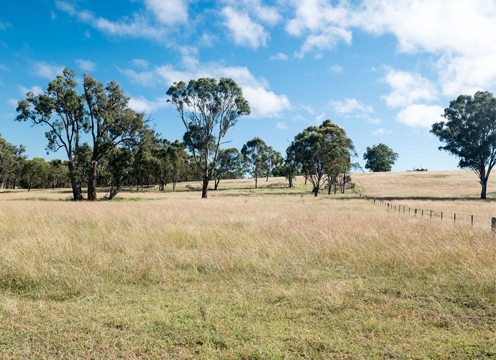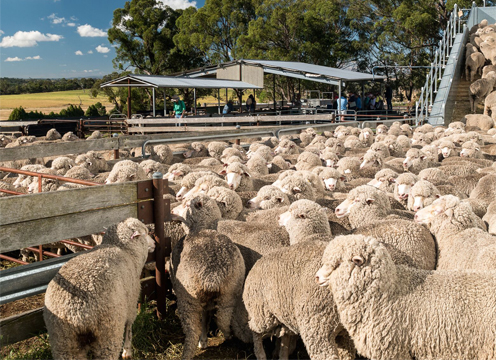Our Resources
Natural Resources
Situated in the New England region of New South Wales, at an elevation of approx. 1000m a.s.l. the soils on the farms derive from heavy basalt, sediments and granite with large granite outcrops prominent on and around Mt Duval that has an elevation of 1400m. Vegetation includes native and improved pastures with areas suited to cultivation, through to the densely wooded Mt Duval supporting old growth native forests and differing forest and woodland types. Mt Duval contains an area of 300ha that has been left ungrazed by livestock since being purchased by UNE in 1972 and provides a model natural ecosystem for ecological research. Riparian zones across Newholme have also been fenced off to exclude grazing by livestock since 1982.

Animal Resources
The UNE SMART Farms are predominately grazing enterprises utilising a mixture of native, naturalised and high performance perennial pastures along with a small area of annual forage cropping.
A commercial Merino flock is managed on the Armidale SMART Farms along with a 1000 Maternal and Merino ewe flock that forms part of the MLA Resource Flock providing genomic information for industry. Replacement sheep and wethers also form part of the sheep flock. A 200 cow breeder herd assist in grazing and parasite management across the Armidale Farms.
Trade and breeder cattle are run on perennial pasture at Tullimba, along with a 1,000 head research feedlot with infrastructure that allows replicated research design.
Along with livestock, there is an abundance of native wildlife for ecological and ecosystem research.

Infrastructure
Along with the usual farm infrastructure of stock handling facilities, woolshed, fences and stock water systems the UNE SMART Farms also have a range of other infrastructure to facilitate research including:
The SMART Farm Innovation Centre (SFIC), located in the middle of Kirby and Newholme, is the physical hub of a heavily-connected landscape with a network of on-farm connected devices. On-farm connectivity comprises the latest and emerging methods including store-and-forward and mesh telemetry, Long Range Wide Area Network (LoRA WAN), mobile phone network and satellite-direct. The networks are linked to the outside world via fibre, fixed wireless and satellite national broadband network, and the Australia’s Academic and Research Network (AARNet) national fibre network. The SFIC is an 'instrumented' research and teaching laboratory and the ultimate site to evaluate and inform innovations in practice and new technologies in a working farm environment. Connecting researchers in partnership with agtech innovators and producers creates the ideal ferment for innovation. The SMART Farms are an ideal environment for innovation in areas including: spatially-enabled livestock management; telecommunication systems and Internet of Things (IoT); earth observation systems monitoring feed base and land use sustainability; datasets of soil, land types, pasture systems, elevation, weather and livestock health; remote & automated monitoring systems; and data integration to assess the effectiveness of management decisions and optimise planning of new infrastructure. The SFIC provides a base for research in these areas but also serves as an education and outreach facility to connect researchers with students, producers, industry and the community. Tullimba Feedlot uses GrowSafe feeders to monitor individual feed intake and allow calculation of breeding values for feed efficiency in beef cattle. GreenFeed units allow measurement of methane emissions from individual animals. Utilised by industry and commercial beef producers (for occasional custom feeding) this feedlot provides the facilities to investigate issues such as feed efficiency, behaviour and effluent management. Tullimba is also home to a 1300 ML dam with a large irrigation licence. UNE is uniquely placed to undertake animal research and teaching activities. In addition to the off-campus SMART farms which have excellent facilities for grazing sheep, cattle and feedlot cattle, the UNE houses a unique complex of facilities known as the Centre for Animal Research and Teaching. The Centre is comprised of a significant number of state of the art integrated animal housing and handling facilities with allied laboratories dedicated to research and teaching. These are located within the CART precinct on the main UNE campus as well as on two of the UNE SMART Farms, and they are supported by a team of skilled technical staff. Animals that can be accommodated include cattle, sheep, goats, poultry, laboratory animals, pigs, wildlife and dogs. All animal research conducted within the CART is overseen by the UNE Animal Ethics Committee and the animals and facilities are regularly monitored to ensure welfare standards are maintained at the highest possible level. The research facilities include a fully equipped feed mill, surgery, recovery room, post-mortem room, climate controlled rooms, laboratories, sample preparation areas, freezers, cool rooms, office space, student breakout area and tea room. In addition, specialised equipment such as a CT scanner, scanning electron microscopes, blood/gas analyser and net energy chambers are available within the precinct. As such, the Centre is able to support a wide variety of research interests with a current emphasis on animal production, welfare, nutrition, parasitology, biomedical research and specific diseases of livestock and poultry. These state of the art facilities - most of which are new or have been recently upgraded. To learn more about the CART Facilities click here. Used primarily as a teaching and amateur astronomy site, the Kirby Observatory holds astronomical equipment including the Webster telescope a 14-inch (35 cm) diameter Schmidt-Cassegrain telescope and multiple 10-cm refractor telescopes. The UNE and Northern Tablelands Amateur Astronomy Society are a community group of enthusiastic amateur astronomers that use and maintain this equipment along with using their own equipment to take astronomical and solar measurements including images and the optical spectra of astronomical objects. Nestled at the base of the Mt Duval, Newholme Field Laboratory is an ideal launching base for ecological research in native flora and fauna and undergraduate teaching. Across Newholme are long term soil, vegetation and wildlife monitoring sites that provide a picture of the change to the natural ecosystem with different farm management practices including grazing, deforestation and reforestation. These sites provide valuable information on the changes in flora and fauna species and nutrient cycling. Across Mt Duval are 25 camera traps monitoring the fauna both native and invasive, and remotely feeding back to a computer in the Newholme Field Laboratory. These cameras record activity from native animals including four main species of macropods and koalas along with other animals such as foxes and deer. The Laureldale Canine Research and Training Facility provides the opportunity for controlled studies in canine behaviour, training and nutrition. Research is non-invasive, using privately-owned dogs. Some of the current research focuses on scent detector dogs utilised for quarantine and wildlife conservation. For all enquiries about these facilities please contact the Centre for Animal Research and Teaching. There are a number of facilities suitable for large scale poultry studies on UNE SMART farms. At Kirby there are 3 poultry sheds. Two of these are older style sheds with no temperature control and these are suitable for layer floor pen work. The main shed is divided into 4 rooms with programmable temperature, humidity, ventilation and lighting control and is suitable for large-scale broiler studies, animal welfare studies or replicated pen studies using the 50 or so small pens that the facility can accommodate. It has a storage/preparation room for sampling days, back-up generator power and toilet facilities. The location makes it ideal for studies where isolation is advantageous. Laureldale has a commercial scale layer shed with the capacity to hold several thousand layer birds in commercial cages. On this site there other sheds that have been adapted for barn and/or free range systems for layers. For all enquiries about these facilities please contact the Centre for Animal Research and Teaching.

